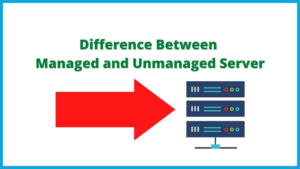It is very important to choose the right type of hosting for your business. Making the choice between managed and unmanaged server is another thing that you might find yourself stuck at. Well, don’t worry!
Once you are aware of the difference between these two, you will be able to decide which is the better one for your business. That’s important because for your business to grow, you need the right hosting solution.
But how do you choose one?
Well, for large enterprises and established businesses, dedicated server hosting can be a better option for their demanding requirements. However, there is still one more decision to make. Whether to choose managed or unmanaged hosting.
This article will shed light on the major differences between the two and their merits and demerits. We will explain everything that you should be aware of about the two options.
Starting now!
Managed and Unmanaged Server: Key Difference Between the Two

Unmanaged server hosting or self-managed hosting means the customer has full responsibility for the server maintenance and management. However, a managed server means the company providing the hosting solution will bear the responsibility of maintaining and managing it.
This is the key difference between the two. Now, let’s dive deeper into a detailed differentiation.
With a managed server hosting, the service provider handles all the technical aspects, updates, and security of the server. With unmanaged hosting, you yourself need to take care of all these tasks for your server.
Managed hosting offers server monitoring, troubleshooting, and backups along with 24*7 technical support and expertise. But unmanaged hosting does not and there might be limited or no support at all.
Another difference between managed and unmanaged servers is that the providers ensure that the server is performance optimized and scalable. On the other hand, it falls upon you to configure and optimize the severe yourself.
There are additional services included in managed hosting like malware scan, software updates, firewall configuration, etc. These services are not typically provided along with the unmanaged servers. Thus, managed servers can be more expensive as compared to the unmanaged servers.
Moreover, it is possible for you to keep your focus on the core business activities rather than on technical tasks. This is another key point that keeps managed and unmanaged servers apart. An unmanaged hosting is not that expensive as you need to manage your server yourself.
However, you need to have technical expertise and time to spare to manage the server. Moreover, managed servers provide a higher level of security since the provider manages updates, security patches, and monitoring. But the unmanaged servers are not so secure if you don’t do anything about it.
What Pros and Cons Do Unmanaged Server Hosting Offer?
There are both merits and demerits of unmanaged servers that you should be aware of before making a decision on which server you should invest in. Let’s find out about them.
Pros of Unmanaged Servers
Full Control: The major advantage is that you get full control over the server. Those businesses or individuals who need root access to their web applications prefer such control.
Flexibility: A template of features or applications is not used with an unmanaged server. Instead, you include those services and configurations that you require.
Affordability: The additional features and services offered by managed servers cost a lot which makes unmanaged servers quite an affordable choice.
Cons of Unmanaged Servers
Expertise: If you do not have an expert team to maintain your unmanaged servers, you will not be able to configure and manage your servers.
Time and Effort: More time is required to manage the servers and extra efforts needs to be implemented for smooth functioning. All the tasks to maintain the server and keeping the server running is your responsibility.
Customer Support: Customer support is limited in the unmanaged server hosting so you have to resolve most of the issues yourself.
Advantages and Disadvantages of Managed Servers
These managed servers provide not only the basic management features but a few extra ones making them pretty beneficial. However, everything has a downside to it. Let’s take a look at them.
Merits of Managed Servers
Expert Customer Service: With the managed server, you get a dedicated team with hands-on experience in the industry available to resolve any technical query or issue you have.
Better Security: There are 24*7 systems available to keep the performance and security at the top. With the managed servers, you get firewalls, cybersecurity standards such as PCI-DSS, and automated backups.
More Scalability: Another difference between managed and unmanaged servers is that managed servers can be scaled up according to your requirements. Meaning that as per your performance, you can increase the bandwidth, CPU, and storage.
Enhanced Performance: With managed servers, providers offer server optimization such as content delivery networks, caching, and autoscaling.
Demerits of Managed Servers
More Expensive: The monthly expenditure on managing the servers is pretty high. It can become a pain point for small businesses.
Untouched Features: There are a few features included in managed servers that you might never even use but are paying for them.
Limit to Customization: Flexibility is not so good with managed servers especially for those businesses that need a higher level of control.
Managed Vs Unmanaged Hosting: Which One to Choose?

After understanding the differences, merits, and demerits of both the servers, you might have a clear understanding of which one is better for you. If not, you can consider a few factors to make that decision:
Spending Limit
The budget that your company has set helps in deciding which hosting service you should choose. It is clear that the expenditure for maintaining managed servers is more as compared to unmanaged servers.
You can always go for a managed or unmanaged server provider that allows you to first compare the prices and go for the cheaper one. Another factor that you can consider here is the extra features that they provide. And if they are valuable for your business or not.
For small businesses, unmanaged servers are the best as they have less costs for the servers. However, for large enterprises demanding higher levels of control and security features can choose managed servers.
Web Applications Requirement
The decision of choosing the server also depends upon your requirements for the website or web applications. These servers are capable of handling workloads efficiently but there might be some additional requirements that work better for your business.
Choosing between managed and unmanaged hosting depends highly upon this. Managed hosting provides features such as monitoring and live security which are pretty great as they keep your website safe.
Moreover, scalable bandwidth can help you match the traffic demands for your website.
But if you need full root access of the server configurations for a safe web application, you will need an unmanaged server. You will get full access over the creation of user accounts.
Technical Knowledge
One major difference between managed and unmanaged servers is that with managed servers, you can access the customer support 24*7. The support team is always available to help customers resolve any issue they face with the server.
But if we talk about unmanaged servers, it is the customer’s own responsibility to resolve all the issues. If you do not have a technical team, it might be difficult to solve any query or issue you might face.
In a Nutshell
It depends majorly upon your business requirements whether to choose a managed or unmanaged server. The differences between the two include scalability, flexibility, budget, configurations, etc. If you are confident enough that you can manage your own server with your tech team or have a low budget, you can go for unmanaged servers. If not, it is better to go for the managed servers as the provider will maintain the server themselves.
About The Author